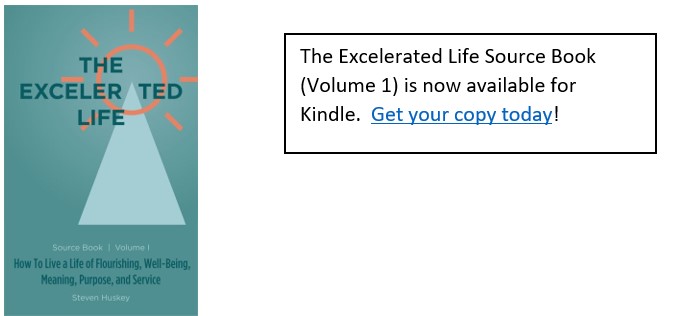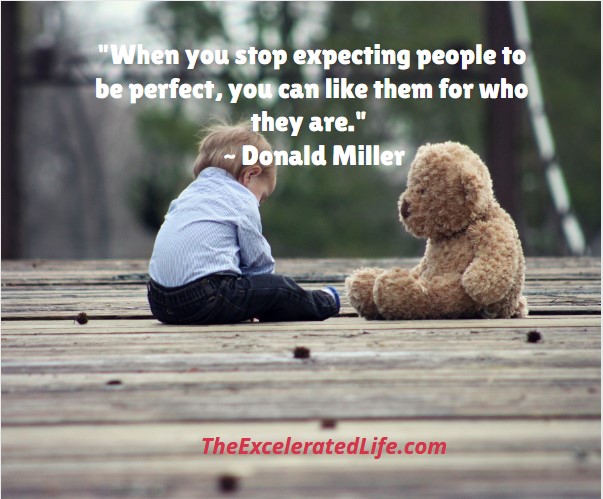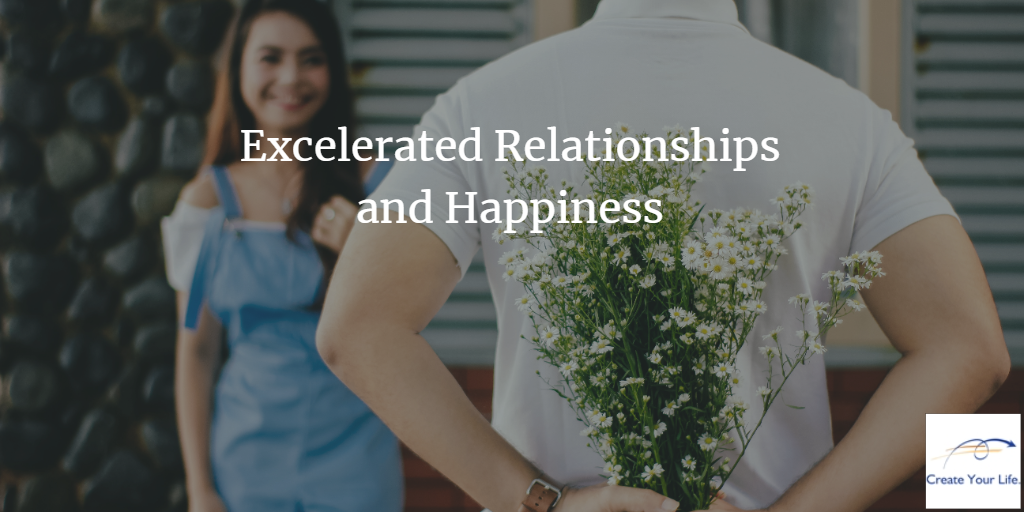Humans are social animals. We need each other. We are made to seek companionship and a lack of social support negatively impacts our potential for happiness and well-being. Social connections increase our feelings of happiness, contentment, and well-being. And they not only make us happier but they improve our health and perhaps help us live longer.
A Good Marriage (?)
Stephen and Rebekah (no relation to yours truly or his wife) were celebrating 50 years of marriage. Theirs had been a happy union. They shared everything. And they discussed every decision. They kept no secrets from each other.
Well, except for one little thing. Rebekah kept an old shoe box at the top of her closet which she had asked Stephen never to open. And he had respected her wishes. In fact, he had forgotten all about the box.
On their 50th wedding anniversary, and thinking about the need to get their affairs in order, Rebekah decided it was time to share the contents of the box. She asked Stephen to fetch it down from the top shelf and bring it to her. Then she asked him to open the box.
When Stephen lifted the lid, he was astonished to see two crocheted doilies sitting on top of a large stack of money, nearly $10,000. He looked at the money, then looked to his wife for an explanation.
“When we were first married,” Rebekah told him, “my grandmother told me that the secret to a happy marriage was never to argue. She said that if I ever got angry over something you did, to keep quiet and crochet a doily.”
Stephen was nearly moved to tears. “Honey, that’s lovely,” he cried, picking up the doilies. “And I’m sorry for those two times that I made you angry. That explains the doilies, but what about all this money?”
“Oh,” said Rebekah. “That’s the money I made from selling the other doilies!” [1]

Links Between Relationships and Happiness
Despite all our disagreements and arguments, we need each other, as I’m sure Rebekah and Stephen would agree. Humans are social animals. It’s likely that we evolved that way. We needed the tribe in order to survive. If a member of the tribe became separated or exiled, chances of survival were nil. We are made to seek companionship and a lack of social support negatively impacts our potential for happiness and well-being
How do relationships make us happier? Because we need to belong, other people are fundamental to our happiness. Research shows that social connections increase our feelings of happiness, contentment, and well-being. Deep relationship bonds not only make us happier but they improve our health and perhaps help us live longer. [Oppong]
But it isn’t only about us. Happiness comes not only from the social support given to us by others, it is also dependent on how we provide support to others. In fact, at least one study has determined that as the support we give to others increases, mortality decreases. [“Relationships and Happiness”]
Of course, as Oliver Burkeman points out, “no experience, least of all close relationships with other human beings, can ever be guaranteed in advance to turn out painlessly and well . . .” [Burkeman] However the evidence shows that it is necessary to try.
What Leads to Good Relationships?
I can think of no better way to improve any relationship than to follow the Golden Rule: “Do unto others as you would have them do unto you.”
In fact, this sentiment has been expressed in some way across all the world’s great religions.
Bahá’í: “Lay not on any soul a load that you would not wish to be laid upon you, and desire
not for anyone the things you would not desire for yourself.”
Buddhism: “Treat not others in ways that you yourself would find hurtful.”
Confucianism: “Do not do to others what you do not want done to yourself.”
Hinduism: “This is the sum of duty: do not do to others what would cause pain if done to you.”
Islam: “Not one of you truly believes until you wish for others what you wish for yourself.”
Jainism: “One should treat all creatures in the world as one would like to be treated.”
Judaism: “What is hateful to you, do not do to your neighbor.”
Taoism: “Regard your neighbor’s gain as your own gain and your neighbor’s loss as your own loss.”
Zoroastrianism: “Do not do unto others whatever is injurious to yourself.”
While there are numerous things we can do to build and improve our relationships, I don’t think there’s a better starting point than this.
When Relationships Go Wrong
Because good relationships play a leading role in our happiness and well-being, it stands to reason that problems in relationships leave us feeling depressed, anxious, and lonely. This applies not only to romantic relationships but to our friendships and work relationships, too. Poor or non-existent relationships have been linked to adverse effects on health and well-being.
Unfortunately, we often fall into the habit of neglecting our closest ties. Because we can do the small things to improve our relationships with our spouses and family at any time, we often never get around to doing them at all. And like other behaviors we tolerate, we often don’t notice until things blow up. Small decisions, over time, either lead upward to cooperation, to close and thriving relationships, or down to misunderstandings, neglect, and broken relationships.
On the other hand, we may be doing small, selfless acts that we believe are strengthening the relationship. But if these acts are based on giving what we want to give or what we think our partner should want, rather than understanding what he or she actually wants, then the result is frustration and unhappiness. [Christensen]
Make Deposits in the Emotional Bank Account
This brings to mind Stephen Covey’s “emotional bank account” we have with those people we are in relationship with. We make deposits and take withdrawals from our emotional bank accounts, just as we do with a financial bank account. Small deposits made into the account over time begin to add up and then, one day when you need to make a withdrawal, it’s there available to you. But it’s important that we understand what the other person wants and what truly makes them happy, NOT what we think will make them happy. What constitutes a deposit for one person may have no effect on another and might even be a withdrawal for someone else. [Covey]
To develop Excelerated Relationships™ and the happiness that comes when we nurture our ties to other people, we must find small and large ways to show our care for others and to be sure what we give is what the other wants.

Ways to Improve Relationships
With that in mind, here are some suggestions to improve your relationships for your consideration.
See things from the other’s perspective. As the old saying goes, “If you’re having a conflict with someone, walk a mile in their shoes. Because then you’re a mile away and you have their shoes!” [Cue laugh track.] Seriously, though, this is a necessary skill for building and improving your relationships. Try to put yourself in the other person’s place and see things as they see them. It’s the only way to ensure you’re making real deposits in the emotional bank account of the other person.
Ask better questions. To expand your social network, ask questions that get the person you’re talking with to open up. While the old stand-bys (“what do you do?” “where do you live?”) are OK for conversation starters, move to deeper questions to help them open up. “What are you interested in these days?” “What’s making you happy or excited?” [Womack]
To build relationships, starting with the easy questions, then moving slowly to more in-depth ones, seems to be the most effective.
“How can I help?” As you’re asking questions, keep this one in mind, especially for your deepest relationships with spouses, children, and close friends. By asking this question, you are asking for direction. Not only is this a respectful question, but by asking it you are better positioned to be of actual help, to make a deposit and not a withdrawal into the emotional bank account. Keep in mind that you are not proposing to solve the other’s problem but offering support and assistance, if appropriate. [Ryan] And as James Ryan tells us in Wait, What?, “how can I help?” is the basis of all good relationships. “It is a question that signals that you care. It signals a willingness to help.” [Ryan]
Be a relationship “researcher”. When facing a relationship challenge, deliberately adopt an attitude of curiosity. Here your goal isn’t to reach any specific outcome, but “to figure out who this human being is that we’re with.” [Burkeman] (Remember the first suggestion – take the other’s perspective?) Not knowing where the next step is going to lead (which Oliver Burkeman reminds us is “the situation you’re always in”) makes choosing curiosity the perfect approach.
First Steps
Research indicates that taking another’s perspective improves our ability to better understand other people’s motives and actions. We typically enter into a relationship focusing on what we want, not what is important to the other person. Changing your perspective to see things from another’s point of view is a powerful tool to deepen a relationship. [Christensen]
Building connections with others is rewarding in and of itself. People with strong, healthy relationships are happier and less likely to feel stressed by challenging situations [Oppong] But happiness doesn’t come only from finding someone who will make you happy. The reverse is also true. Find someone you want to make happy, “someone whose happiness is worth devoting yourself to.” [Christensen]
And keep in mind the emotional bank account. Investments in relationships with family and friends must be made well in advance. If you put off making deposits into their emotional bank accounts until you need them, it’s already too late
We Need Each Other
“We need each other, and we literally cannot live without each other.” ~ Earl Nightingale
The clock for building strong, deep relationships is ticking. Don’t wait until you need it before you start making deposits. You must take steps to build and nurture relationships along and along, one small deposit after another.
Be a relationship researcher. See things from the other’s perspective. Ask good questions, including “How can I help?” And know what makes a deposit in the emotional accounts of those you love.
Friendship doesn’t come free. It takes commitment and it takes work. But there are shortcuts. [“Relationships and Happiness”] And one of the best shortcuts is simple kindness. Be kind to others. It’s one of the best deposits you can make. And as you make continuous small deposits into your relationships, they’ll grow stronger and more fulfilling. That is developing Excelerated Relationships™. And that’s how you embrace your Excelerated Life™!
Do you have a relationship that needs a little TLC?
What is one small step you could take to strengthen it?
Share your experience by leaving a comment below.
Developing Excelerated Relationships™ — nurturing ties to other people — is one step in creating your Excelerated Life™, a life of flourishing and well-being, and a life of meaning, purpose, and service.
Read more about the Excelerated Life™.
Footnotes:
[1] I adapted this example from a story on the BusinessBalls website.
https://www.businessballs.com/amusement-stress-relief/stories-analogies-and-fables/#-the-shoe-box
Resources:
Burkeman, Oliver. Four Thousand Weeks: Time Management For Mortals. New York: Farrar, Straus and Giroux, 2021.
Christensen, Clayton M. How Will You Measure Your Life? New York: HarperCollins Publishers Inc., 2012.
Covey, Stephen R. The Seven Habits Of Highly Effective People. New York: Simon & Schuster, 1989.
Oppong, Thomas. “Good Social Relationships Are The Most Consistent Predictor of a Happy Life.” Thrive Global. Thrive Global, October 18, 2019. Web. February 4, 2023.
https://thriveglobal.com/stories/relationships-happiness-well-being-life-lessons/
“Relationships and Happiness” The Pursuit Of Happiness. Pursuit of Happiness, Inc.,. Web. February 4, 2023.
https://www.pursuit-of-happiness.org/science-of-happiness/relationships-and-happiness/
Ryan, James E. Wait, What? And Life’s Other Essential Questions. New York: HarperCollins Publishers Inc., 2017.
Womack, Jason W. Your Best Just Got Better: Work Smarter, Think Bigger, Achieve More. Hoboken, NJ: John Wiley & Sons, Inc., 2012.


